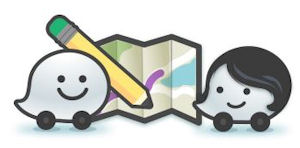I had never heard of Waze until I read this morning that the Israeli mobile-map company was coveted by the likes of Google, Apple and Facebook and potentially worth more than $1 billion. But as soon as I visited the Waze website, I realized it was my dream come true — a smart-phone app that not only allows me to find the fastest route to a destination but is capable of adjusting the route based on real time traffic data.
Waze reportedly has 40 million users worldwide, and the numbers are growing exponentially. In a typical networking effect, the more people who download Waze and give it permission to track their movements, the better its traffic-data and the more useful the service…. and the greater the number of people who will download the app. As a 60-year-old family guy, I don’t engage in illicit activities or have any girlfriends on the side, so I’m not paranoid about “big brother” tracking my movements.
Besides taking into account real-time traffic movement, Waze has tools that allow people to report accidents, obstructions, police presence, current gasoline prices and other items of interest to drivers. Frankly, I don’t know if I have the level of interest to delve into that level of detail, but having the option is cool.
I have no earthly idea whether Waze is worth $1 billion, but I do feel certain that Google, Apple and other map-and-routing apps will seek either to acquire or replicate its functionality. It’s just a matter of time before real-time traffic data affects the driving patterns of everyone.
Showing people where they can find alternate routes for reaching their destination should allow a gridlocked region like Northern Virginia to eke a little extra capacity from its network of roads and highways. But we have to be realistic: When a transportation system is already overloaded and the capacity of every arterial is already maxed out, the potential gains from re-routing routine travel paths is limited.
I am hoping that Waze will be more useful in the Richmond region, where I live and the transportation system has more slack and flexibility built in. I also expect Waze to be helpful when visiting my parents in Norfolk — how backlogged is the Hampton Roads Bridge-Tunnel? Should I take the longer, less congested route through Petersburg and Suffolk?
Waze wave shows how IT is transforming the transportation landscape in ways that no one could have imagined four or five years ago. If anyone purports to know where all this change is taking us, they are deluded. Transportation systems are far too complex and interactions far too unpredictable to say anything with certainty.
In situations like this, I fall back upon Nassim Nicholas Taleb’s maxim that forecasting the future is a fool’s game. Instead of trying to predict the future, we need to make our systems “antifragile” — robust, resilient, flexible, adaptable and capable of exploiting new circumstances.



